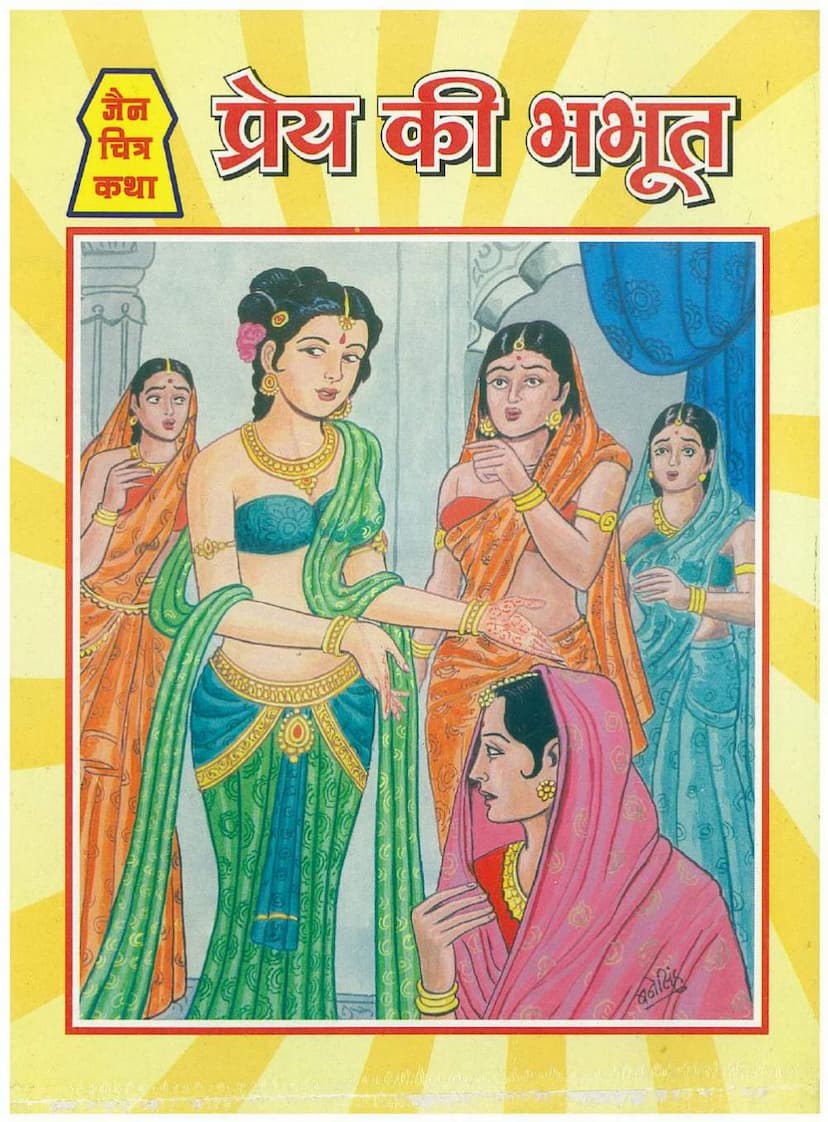Prey Ki Bhabhut
Added to library: September 2, 2025

Summary
Here's a comprehensive summary of the Jain text "Prey Ki Bhabhut" based on the provided pages:
The book "Prey Ki Bhabhut" (The Ash of Desire) by Rekha Jain, published by Acharya Dharmshrut Granthmala, is a Jain illustrated story that emphasizes the importance of struggle, character, and spiritual growth over material pursuits.
The Central Theme:
The story revolves around the character of Narmada Sundari, a beautiful and virtuous woman whose life is a testament to the Jain ideals of perseverance, moral strength, and the pursuit of spiritual well-being. The narrative highlights that true progress and elevation in life come through overcoming challenges and maintaining inner purity, much like water that evaporates through the sun's rays and rises, leaving impurities behind.
Key Plot Points and Moral Lessons:
-
The Power of Struggle: The editorial emphasizes that growth comes from struggle. Those who embrace challenges and forge their own paths rise higher, while those who stick to pre-made paths stagnate.
-
Narmada's Virtuous Upbringing and Early Trials: Narmada is born into a wealthy family and married into an equally prosperous one. However, fate intervenes, and she is abandoned in a desolate forest. Her strong character helps her navigate these initial hardships and eventually reconnect with her paternal uncle.
-
Resisting Temptation: Narmada then falls into the clutches of unethical women (implied to be prostitutes). Despite the temptations and difficult circumstances, she steadfastly maintains her virtue and discretion, demonstrating immense inner strength.
-
The Importance of a Virtuous Spouse: Narmada's father, Sahdev, an affluent merchant, desires a specific pregnancy experience: bathing in the Narmada River. He undertakes a long journey to fulfill his pregnant wife's wish. During this journey, he establishes a prosperous city named Narmadapur, which flourishes due to his business acumen and the discovery of a gold mine. This part highlights the rewards of fulfilling desires and strategic planning.
-
Narmada's Marriage and Ideological Conflict: Narmada is born as a beautiful and intelligent child, named after the river. As she grows, she receives a good education. Sahdev wishes to marry her to someone of similar dharma and values. A wealthy merchant named Maheshwar proposes. While Maheshwar is wealthy and accomplished, he holds materialistic and utilitarian views, believing that unethical means are necessary for business success. Narmada, on the other hand, strongly believes in Ahimsa (non-violence), truth, and righteous conduct. This creates an ideological conflict.
-
Maheshwar's Deception and Narmada's Marriage: Maheshwar, infatuated with Narmada's beauty, abandons his principles (non-violence) and deceives Sahdev to get married to Narmada. Narmada's father, despite his reservations about Maheshwar's views, agrees to the marriage, perhaps influenced by societal expectations or a desire for his daughter's immediate happiness.
-
Marital Discord and Narmada's Steadfastness: After marriage, Narmada and Maheshwar constantly debate their differing ideologies. Maheshwar argues that unethical practices are necessary for business, while Narmada advocates for righteousness and spiritual well-being as the true goals of life. Narmada's unwavering adherence to Jain principles and her spiritual discussions impress Maheshwar's family, but her ideological differences with Maheshwar persist.
-
Abandonment at Sea: While traveling to the Yavan Islands for business, Maheshwar, driven by suspicion and influenced by a manipulative singer, abandons a sleeping Narmada on a desolate island. He falsely claims she was taken by a monster to avoid the sin of killing his wife and to prevent her from influencing his business dealings.
-
Narmada's Ordeal and Spiritual Growth: Stranded and alone, Narmada undergoes immense suffering. She reflects on her karma and resolves to remain virtuous. She practices austerities, contemplates the Pancha Namaskar Mantra, and waits for liberation from her plight. Her suffering, however, is seen as a consequence of her past deeds.
-
Rescue and Further Tribulations: Narmada is eventually found by her maternal uncle, Veerdas, who is astonished to find her on the deserted island. He rescues her and takes her to the port city of Babbarkul. Here, Narmada's exceptional beauty attracts the attention of Harini, the madam of a brothel. Harini, through deceit and force, tries to make Narmada a prostitute. However, Narmada remains steadfast in her chastity, relying on prayer and spiritual contemplation.
-
Narmada's Devotion and Escape from Prostitution: Narmada's inner strength and unwavering devotion lead her to feign madness to escape the clutches of Harini and the king. She is eventually released from the royal palace and begins her life as a mendicant, seeking spiritual solace.
-
Embracing Asceticism: Narmada, now disillusioned with the materialistic world and its hypocrisy, approaches a Jain Acharya and requests to become an Aryika (a fully ordained nun). She renounces her worldly possessions and dedicates herself to spiritual practice and public service.
-
Narmada's Legacy and the "Bhabhut of Desire": As an Aryika, Narmada dedicates herself to enlightening women, advocating for their self-reliance, purity of mind, and spiritual awakening. The title "Prey Ki Bhabhut" (The Ash of Desire) refers to the ultimate outcome of her journey: burning away worldly desires and attachments through rigorous spiritual practice and adherence to Jain principles, leading to liberation.
Overall Message:
"Prey Ki Bhabhut" is a powerful narrative illustrating that true wealth lies not in material possessions or worldly pleasures but in one's character, inner strength, and adherence to spiritual principles. It teaches that by conquering desires and embracing righteous conduct, individuals can overcome adversity, achieve spiritual elevation, and ultimately attain liberation. The story serves as an inspirational guide for readers, particularly women, to find strength and purpose through Jain philosophy.